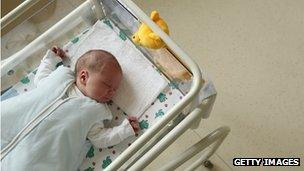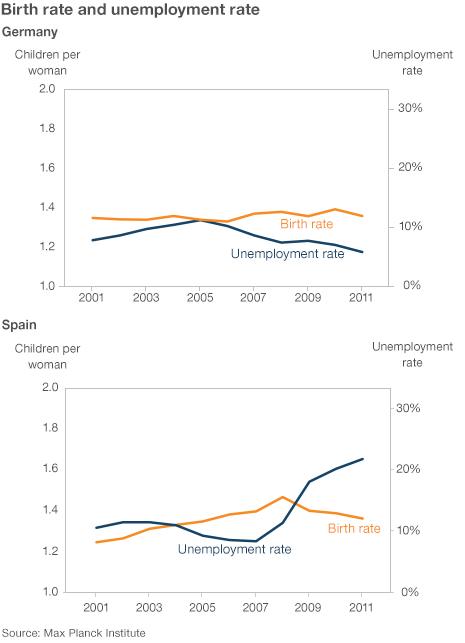Europe birth rates 'have fallen' since economic crisis
- Published

Europeans under the age of 25 have had fewer babies as unemployment has risen
Fewer babies have been born in Europe since the start of the financial crisis in 2008, a new study shows.
The Max Planck Institute for Demographic Research, external in Germany found that the birth rate in 28 European countries dropped as unemployment rose.
People under 25 have been particularly affected, along with those living in southern European countries like Spain.
The relationship between the economy and fertility has long been discussed, but remains controversial.
Researchers at the MPIDR said their study proved that "the extent of joblessness in a contemporary European country does in fact have an effect on birth rates".
Weathered the crisis
"The financial crisis hit Europe at a time when birth rates in many countries had just began rising again," said demographer Michaela Kreyenfeld.

She said upward trends in some countries had come to a halt while in others, birth rates declined.
In Spain, the total fertility rate - the number of births per woman - fell nearly 8% between 2008 and 2011 as unemployment went from 8.3% to 11.3%.
A setback also occurred in Hungary, Ireland, Croatia and Latvia, the study said.
Formerly growing birth rates slowed in countries such as the Czech Republic, Poland and the United Kingdom.
But in Germany and Switzerland, where labour markets have weathered the crisis comparatively well, there was almost no change in the number of children born.
Europeans under the age of 25 have especially restrained from having children in the face of rising unemployment rates, the research shows. However it notes that many may be postponing having a family rather than deciding not to have one at all.
The study says a 1% increase in unemployment rates causes fertility to fall by nearly 0.2% among those aged 15 to 19, and 0.1% between 20 and 24.
But rising unemployment did not cause birth rates to change for those over 40.
"Fertility plans can be revised more easily at younger ages than at ages where the biological limits of fertility are approaching," said Ms Kreyenfeld.